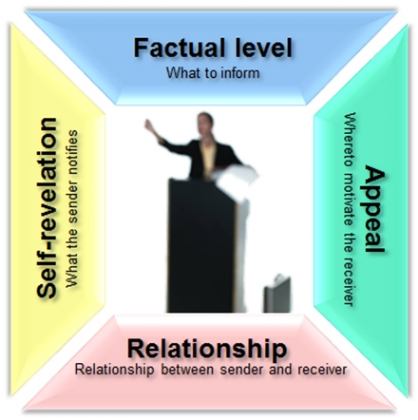Message aspects
The message is the core element of a message. The editing in speech, writing and picture as well as through posture and intonation always contains more than the obvious information. Depending upon intention, these aspects are often considered more or less consciously and incompletely. The message aspects are based on the four-side model of Friedemann Schulz von Thun. On the one hand, it is possible to consider the different aspects in formulating the message. On the other hand, the various listener types of the target group are better taken into account.
Four aspects form the perspectives: Factual level, Appeal, Relationship, Self-revelation.

- Factual level
contains the figures, data and facts to be communicated. These objective contents can be checked relatively easy concerning correctness, relevance and completeness. For example: „Very bad weather is approaching” means on factual level „A low pressure system brings the next hour heavy rain (60 liters per square meter per hour)“. To improve the message, it is preferable to provide specific information, since everybody understands something else as „very bad weather “. - Self-revelationpresents information that describes the sender. This can be goals, strategies, intentions, etc., which are communicated, without being stated explicitly. For example: „Very bad weather is approaching“ means in self-revelation „I don’t know, what that means“. Be aware of your mental state and express it explicitly.
- Relationshipclarifies the relation between sender and receiver from the perspective of the sender. In this case, appear hierarchical differences, affections and aversions, or customer/supplier relationship. For example: „Very bad weather is approaching“ means in relationship „Do what I say!“. Underline your understanding of the relationship, by defining role and position of the participants.
- AppealNews imply expectations of the sender towards the receiver. These can be orders, requests, pleas or hopes, which stimulate the receivers to do or not to do something, to obey or to behave freely. For example: „Very bad weather is approaching“ means in the appeal „Get sand bags for stabilizing the dyke!“ Always clarify what you expect from all. The more specific the tasks, the better these are settled.
